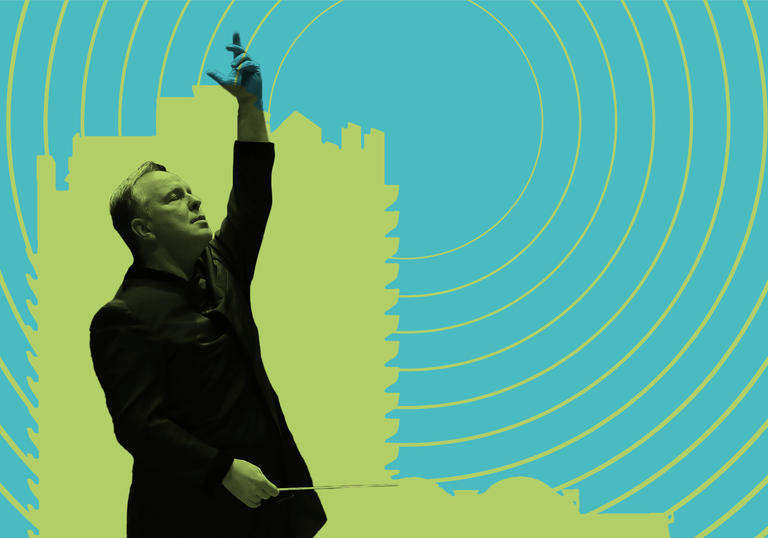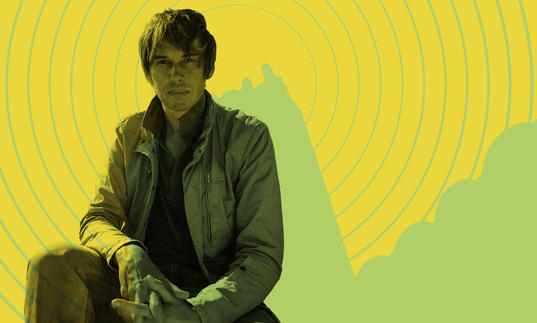Tonight’s concert begins with what is arguably Anna Clyne’s most-performed work. Within her Arms is a seminal piece in her musical development for it was the point at which she realised that she was indeed a composer, modestly remarking: ‘That is how I like to express myself’. She is British-born but US-based and the commission for this piece came from the Los Angeles Philharmonic’s Green Umbrella series for young composers. The medium she chose was 15 strings and music she wrote was initially, she recalls, ‘very energetic and chaotic’. All that changed with a phone call and the devastating news that her mother had died unexpectedly. She flew back to England and within a day had recomposed Within her Arms as a heartfelt elegy. There’s an unmistakable sense of the music caressing the listener as the string lines move separately yet harmoniously. The medium itself allows both luminosity and in places a sparseness of texture, which makes the passages where the music builds to a peak of intensity, violins high over low-lying drones, all the more heartrending.
For Within her Arms, which is dedicated ‘for my mother, with all my love’, Anna Clyne has written no note, but simply appended a poem by the Vietnamese Buddhist monk Thích Nhat Hanh:
Earth will keep you tight within her arms dear one –
So that tomorrow you will be transformed into flowers –
This flower smiling quietly in this morning field –
This morning you will weep no more dear one –
For we have gone through too deep a night.
This morning, yes, this morning, I kneel down on the green grass –
And I notice your presence.
Flowers, that speak to me in silence.
The message of love and understanding has indeed come.
Of Haydn’s 104 symphonies relatively few are in the minor key. That might seem a fairly banal observation, but during this era keys were very much associated with particular moods, and it’s no coincidence that many of the minor-key works are products of Haydn’s Sturm und Drang style – a term that later became crystallised of works of art involving high emotion – often translated as ‘storm and stress’. Haydn’s Symphony No 49, written in 1768, is a supreme example of this, for unusually all four of its movements are in F minor, creating a sombre quality that is very potent. As so often with nicknames, we can’t be sure where La Passione comes from but one of the more plausible theories is that it was first performed on Good Friday (hence the Passion reference) at the Eisenstadt Palace of Haydn’s patron Prince Esterházy. Certainly, the penitential-sounding opening movement fits that nickname – a large-scale Adagio formed from a theme of just four notes that will reappear in the three remaining movements. Even the brief moments in the major fail to lift the darkness, reminding us that Haydn could give Mozart a run for his money when it came to minor-key angst.
This sits in tremendous contrast to the agitation of the second movement, the theme now given a jagged, almost violent energy. In the Menuet Haydn transforms the theme again, smoothing it out, and the mood lightens temporarily in the F major Trio, though the horn-writing is perilously high-lying. Matters remain dark in the finale – which is terse and unremitting right to the close.
The Finnish composer Magnus Lindberg first made his name as a modernist but his style has evolved in intriguing directions over the decades and crucial in that process have been two major residencies – with the New York Philharmonic and the London Philharmonic Orchestra. Accused was co-commissioned by the latter together with the Gothenburg and Toronto Symphony orchestras, Radio France, the Cleveland Orchestra and Carnegie Hall. It was premiered in London in 2015 but Lindberg has since revised it – working closely with tonight’s conductor and soprano soloist, Sakari Oramo and Anu Komsi. Tonight marks the world premiere of the version for voice and chamber orchestra. For the soprano soloist the work is demanding in the extreme, not only technically but also in having to switch language and to convey the characters of questioners and victims with equal feeling.
As the title indicates, the subject matter of Accused juxtaposes different moments of interrogation through history. The first text is in French and takes us back in time to 1791; it portrays the interrogation of Mme Théroigne de Méricourt in an Austrian prison following her actions during the French Revolution. She was a remarkable figure – a singer and a strong advocate of revolution, though she paid a heavy price, being incarcerated, declared insane and eventually dying in 1817. The second text is in German and transports us to a Stasi interrogation of an unnamed citizen in East Germany during the 1960s; Lindberg emphasises the contrast between questioner and victim through the contrasting music – by turns aggressive more gently melodic. The third section is in English and the action takes place in 2013, where an American hacker named Adrian Lamo is being ‘interviewed’ – he infamously revealed that former PFC Manning had divulged much sensitive information to Wikileaks. In Accused the questioner is given the vast majority of the text and it’s only near the end that the interrogatee rises from submission for one last outburst.
© Harriet Smith







